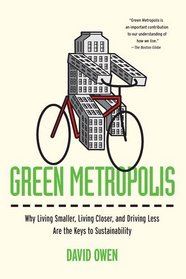Green Metropolis is not suited to bedtime reading. If you are interested in reading this book, chances are you care about the environment, and New Yorker staff writer David Owen will turn your ideas upside down.The first chapter celebrates Manhattan as an environmental role model. The second describes how utterly dependent our way of life is on oil. From there he makes an articulate argument that population density is the key to saving the environment. Specifically, urban centers, by being dense and car-unfriendly enough, force its citizens to behave in sustainable ways. The car is an insidious enabler of sprawl, encouraging us to build "embodied inefficiencies" into American life. We can't count on our conscience to help save the environment; rather, our desire to be surrounded by nature and away from other people leads us, however well-intentioned, to destroy the very thing we seek to preserve.
Very well said and good. But like many "big idea" books, it leaves us right to the edge of a cliff of nihilism. Even Owen admits we are not going to tear apart our continent to start over. Even I, a life-long city dweller, ready to agree with his analysis, don't want to live any denser after a long visit to Hong Kong, a city Owen mentions as being doubly constrained geographically and geopolitically, so I can't see how many people will change their minds—how many times have I heard that "New York is a great place to visit, but not to live"? Even if people wanted to, can they afford to live in cities? Ultimately, the most impact I hope Green Metropolis may have is to encourage people to embrace the boring low-lying fruit in terms of energy efficiency instead of being seduced by 'LEED brain,' i.e. that being good to the environment means glamorous, high-tech, and expensive changes. That is, if the green-minded and locavores can get past his criticism.




![header=[] body=[Get a free book credit right now by joining the club and listing 5 books you have and are willing to share with other members!] Help icon](/images/question.gif?v=90afaeb39)
